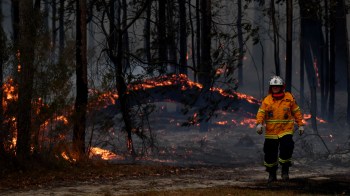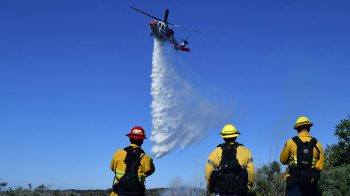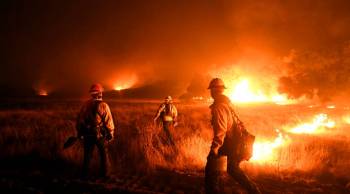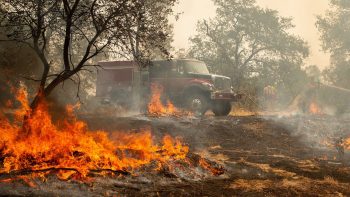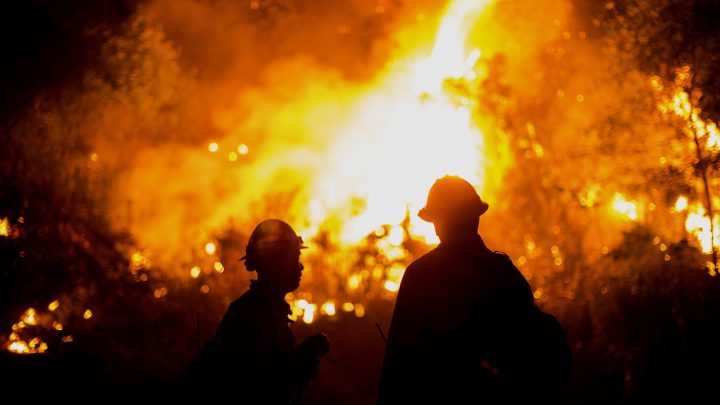
How the budget fight in Congress threatens federal wildland firefighters’ pay
How the budget fight in Congress threatens federal wildland firefighters’ pay

In June, wildland firefighter Daniel Uphues was out with a U.S. Forest Service crew “mopping up” after a burn in western Washington. That’s wildland fire speak for digging up and extinguishing any material that’s still smoldering in the aftermath of a fire.
“People were thinking, ‘It’s getting a little windy. I don’t know if we should be here,’” he said.
Wind speeds never topped 10 mph; that was the threshold for when his crew boss would pull them off the fire line, Uphues said. But things still got dangerous.
“You hear the creaking and popping of a tree falling. Everyone starts yelling, trying to give indications of where the tree is falling,” he said.
Uphues said the top half of what he guesses was a 120-foot-tall red cedar crashed to the ground some 30 feet from his crew.
After the shock wore off, he was mad. Uphues and his colleagues were risking their lives for wages that they probably could have been making in fast food or retail.
“There were a lot of those comments at that specific moment. And I think about that a lot, actually,” he said.
Federal wildland firefighters protect ecosystems and communities from the impacts of increasingly frequent and destructive wildfires on public lands. Historically, they haven’t been paid much for that vital and dangerous work. Rookie federal firefighters can make as little as $15 an hour. In 2021, they all got a raise from the Inflation Reduction Act of 50% of their base salary, or an extra $20,000 a year.
For Daniel Uphues, that was a big deal. It brought his base salary from just $15.50 to $22 an hour, which — after working as many as 800 hours of overtime per season — nets him between $55,000 and $60,000 a year. That’s helped Uphues pay off student loans from his bachelor’s degree in history and Spanish, and put more away in savings.
“You can feel the difference, for sure,” he said.
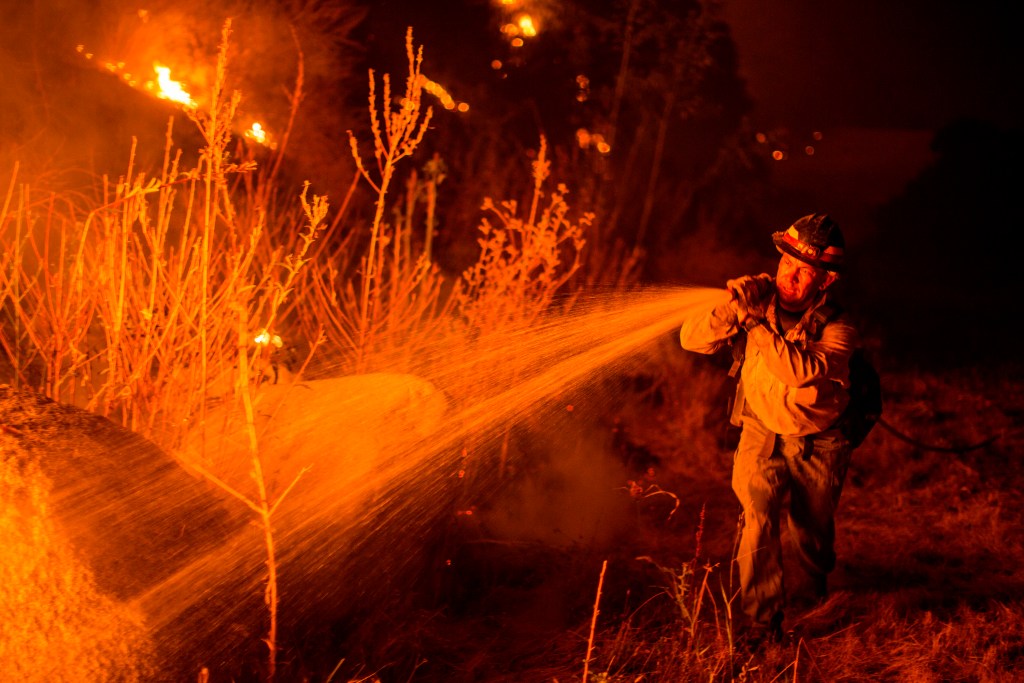
Low pay and longer seasons for federal firefighters
Federal funding for that pay bump ran out last September. Congress has extended firefighters’ higher salaries temporarily three times this budget cycle in continuing resolutions. A permanent fix has bipartisan support, but it’s tied up in the larger congressional budget showdown. And after repeated delays, firefighters will believe it when they see it.
“There are other people [I work with] that have talked about, you know, maybe going into a state agency,” Uphues said.
A state agency like California’s can pay firefighters double what they make with the U.S. Forest Service. Same with some private or city-run fire departments. And the more times Congress punts on federal firefighter pay, the better those jobs start to look to frustrated workers.
“Most folks are on really thin ice,” said Kelly Martin, who heads up the International Association of Wildland Fire.
She said the uncertainty has experienced firefighters especially fed up, since they have the most to gain by moving on.
“There’s just such a tremendous loss of experience and qualifications when individuals can’t pencil it out anymore,” she said.
With climate change and megadrought making wildfires more intense, Martin said containing them has become more complex. And without veteran firefighters, she said crews lose the skills and capacity needed to protect lives, ecosystems and property.
More frequent fires and a lengthening wildfire season are also changing the profession, according to Michael Wara, a climate policy expert at Stanford University.
“It’s kind of raised the tempo of activity,” he said. That means firefighters work longer seasons and may be exposed to dangerous conditions for longer. “And that wears people down. They really need the off-season to recover physically and mentally.”
When the pay is lower, many firefighters work another job in the winter to supplement their income instead of taking time off. Wara said inaction from Congress gives federal firefighters the sense that they’re not a priority.
“It’s corrosive,” he said. “And sooner or later, those people tend to go where they feel valued.”
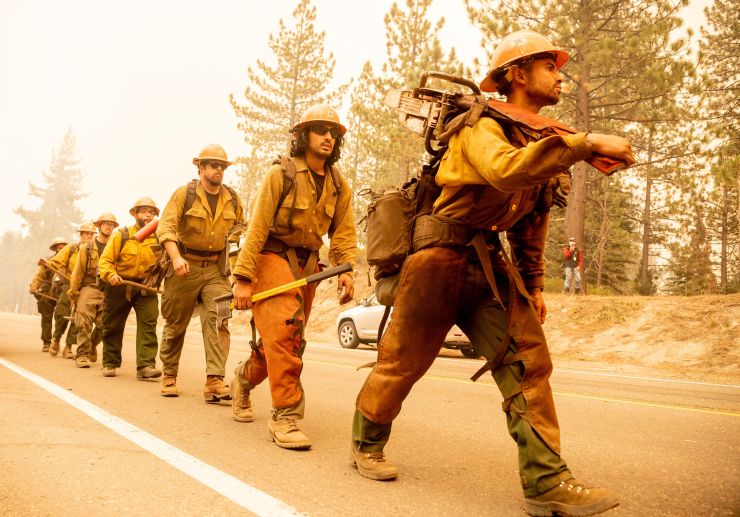
“You can only get paid in sunsets so many times”
In Northern Michigan, Warner Vanderheuel worries a wave of resignations could be coming for his crews ahead of fire season.
“Well, I can’t afford anybody to leave right now,” Vanderheuel said.
On top of his day job as a battalion chief with the Forest Service, Vanderheuel is general vice president of the National Federation of Federal Employees Forest Service Council. Since this pay discussion started in earnest back in September, he reported that turnover is high and hiring is slow.
“We’re at bare minimum staffing to meet the day’s requirements. So having someone take a day off is very difficult,” Vanderheuel said.
By now, maybe you’re thinking, “This job sounds pretty grueling. Why would anyone sign up for it?”
Well, Daniel Uphues, the firefighter who nearly had a tree fall on him, wants you to know he has other stories — about all the cool places his job has taken him, crew camaraderie and beautiful backcountry scenery.
“But you can only get paid in sunsets so many times,” Uphues said.
Uphues, who was hired as a seasonal employee in 2020, recently scored a coveted, permanent wildland firefighting job with the Forest Service. It comes with great retirement benefits. He’s hoping that with some pay certainty, he can stick around.
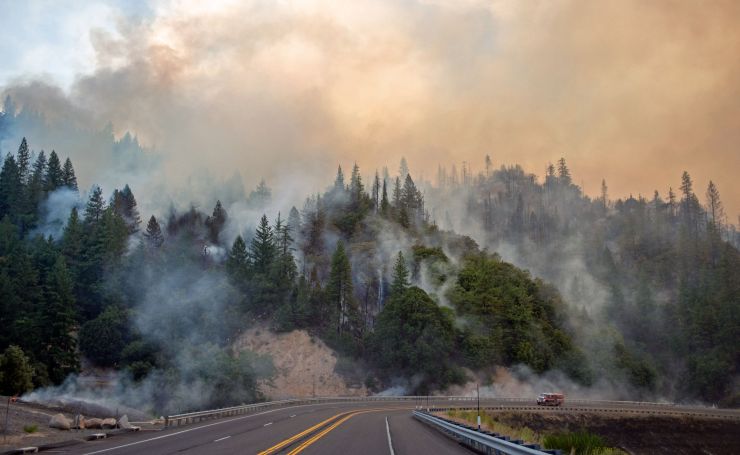
There’s a lot happening in the world. Through it all, Marketplace is here for you.
You rely on Marketplace to break down the world’s events and tell you how it affects you in a fact-based, approachable way. We rely on your financial support to keep making that possible.
Your donation today powers the independent journalism that you rely on. For just $5/month, you can help sustain Marketplace so we can keep reporting on the things that matter to you.



